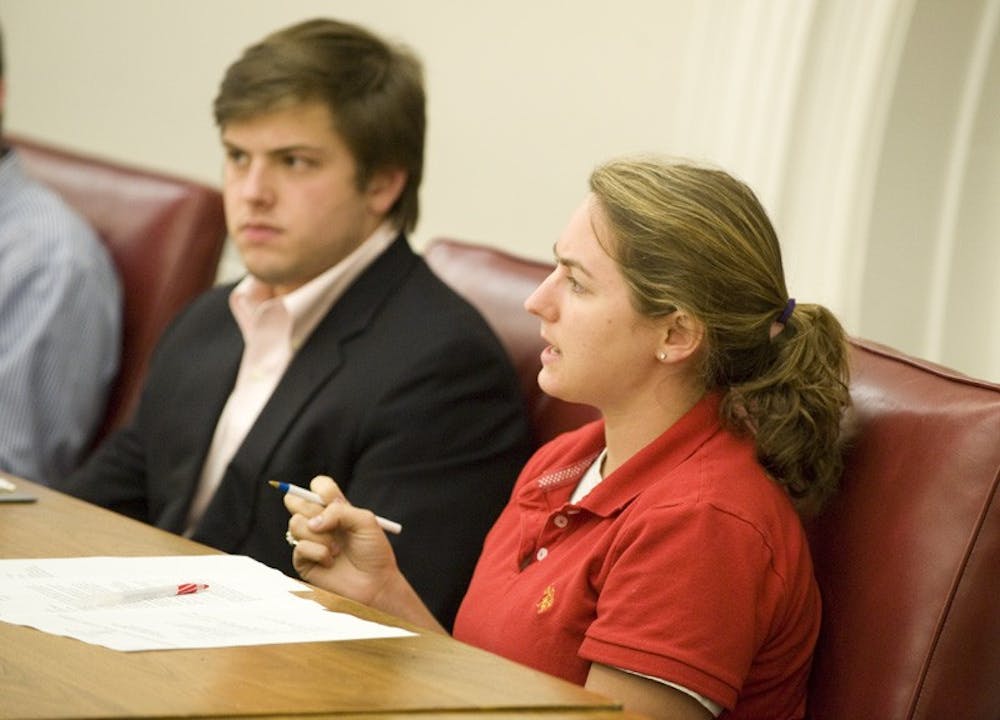The Honor Committee discussed a proposal to redefine plagiarism at its weekly meeting Sunday night.
The proposed definition change, drafted and spearheaded by JJ Litchford, vice chair for community relations, would both alter and add elements to the current definition of plagiarism in the Honor Manual.
Litchford said the need to redefine plagiarism became clear after a series of cases involving plagiarism and paraphrasing, including the controversial "Semester at Sea" case in summer 2008, which indicated that the definition needed to be made more clear for students. He also noted that plagiarism is the most commonly reported honor offense.
To help create a new definition, Litchford turned to English Prof. Gregory Colomb, who has authored several books about dissertation writing and proper citation. After working with Colomb, Litchford said he drafted a proposal that includes "two essential changes" to the current definition.
The present definition begins with, "Plagiarism is using someone's ideas or work without proper or complete acknowledgment." To emphasize the question of whether the writer is attempting to pass someone else's ideas off as his own, Litchford proposed the sentence: "Plagiarism is attempting to represent someone else's ideas or work as your own original ideas or work."
Litchford said this sort of change, though minor, would help make the University's definition of plagiarism closer to the nationwide standard, as well as create a definition that is more applicable to all departments, not just the College.
"To center only on citation is grossly ineffective and insufficient to deal with plagiarism," Litchford said, adding that there is more to plagiarism than proper citation.
Litchford also chose to add a sentence about paraphrasing in the new definition of plagiarism. This change, which is more extensive than the first, would be connected to an entirely new section in the Honor Manual that defines and explains paraphrasing. The section would be an explicit and detailed explanation about how to recognize paraphrasing, Litchford said, and could possibly include a definition of paraphrasing and also examples of proper and improper paraphrasing.
Some of the possible benefits of adopting Litchford's proposal include a clearer idea about what plagiarism is, Honor Chair David Truetzel said, as well as an opportunity for the Committee to increase education about its policies and perhaps consequently decrease the number of plagiarism cases reported.
These changes will help not only new students entering the University who are unaware of the policies, but would also become an "integral resource for the investigations and trials process," as it would create a definitive "stance on paraphrasing" for the Committee, Litchford added.
At the same time, the Committee must make the definition flexible enough to cover the variety of cases presented to the organization, Truetzel said.
"We need it to be broad enough to cover everything, but specific enough that it means something, makes sense and is clear about what a wrong act is," Truetzel said.
Although the possible additions offer clearer guidelines, it also introduces a significant level of subjectivity that may not exist now, Litchford noted.
Additionally, the new definition would posit that accidentally citing something incorrectly would not truly pass as plagiarism, an idea with which some professors and students may disagree, Litchford said.
"I think it's really critical to make sure we have a full clear definition because you want people to be on notice of [what is and is not plagiarism]," Truetzel said.
The next draft of Litchford's proposal will be discussed during the coming weeks' meetings, Truetzel said.







